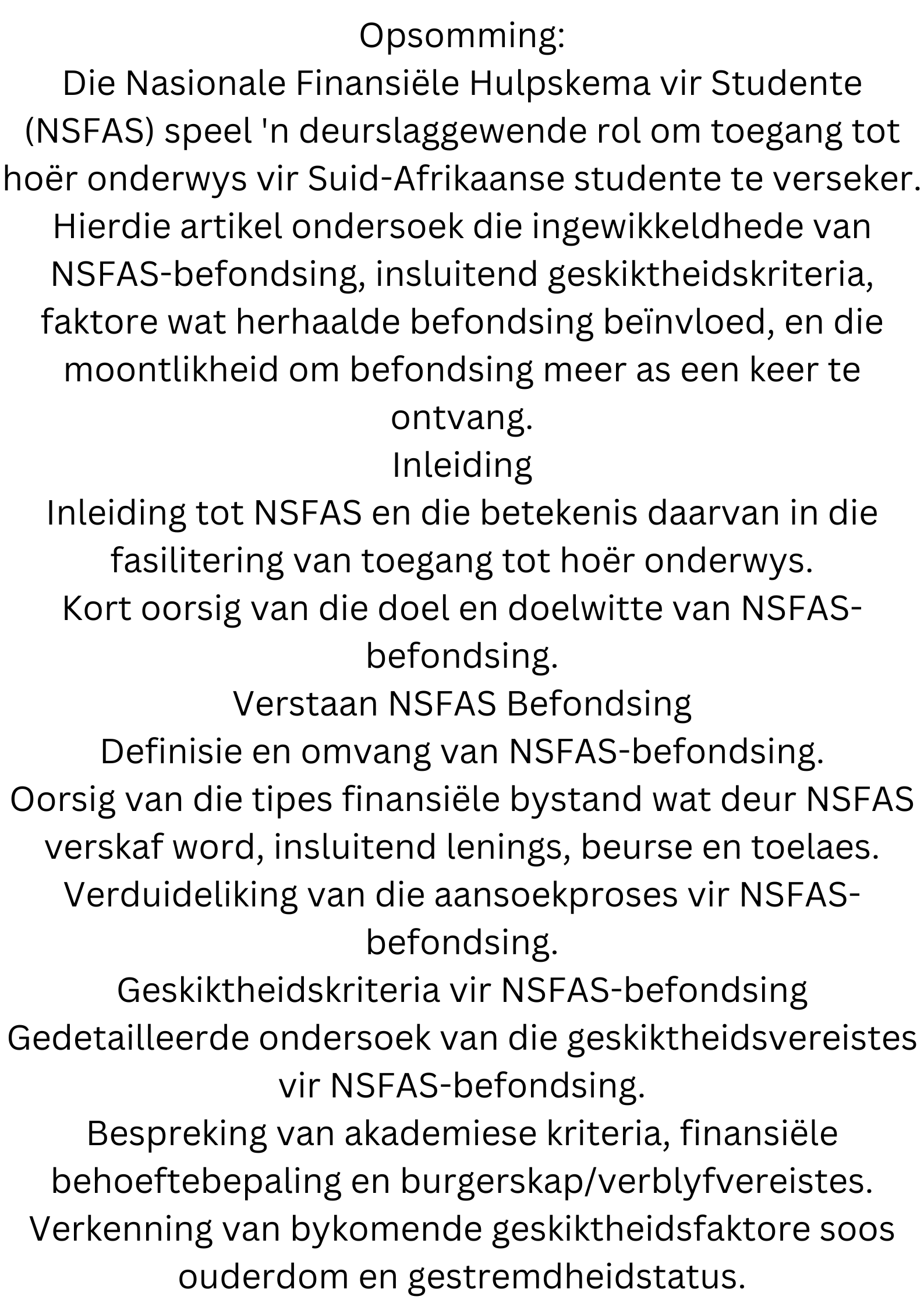Exclusive News: NSFAS Funding Maximizing Educational Opportunities 2024
The National Student Financial Aid Scheme (NSFAS) plays a pivotal role in ensuring access to higher education for South African students. This article explores the intricacies of NSFAS fund, including eligibility criteria, factors affecting repeat funding, and the possibility of receiving funding more than once.
Introduction
Introduction to NSFAS and its significance in facilitating access to higher education.
Brief overview of the purpose and objectives of NSFAS fund.
NSFAS Funding
Definition and scope of NSFAS funding.
Overview of the types of financial assistance provided by NSFAS, including loans, bursaries, and allowances.
Explanation of the application process for NSFAS fund.
Eligibility Criteria for NSFAS Fund.
Detailed examination of the eligibility requirements for NSFAS fund.
Discussion of academic criteria, financial need assessment, and citizenship/residency requirements.
Exploration of additional eligibility factors such as age and disability status.

Factors Affecting Repeat Funding
- Analysis of the possibility of receiving NSFAS fund more than once.
- Examination of the criteria and considerations for repeat funding eligibility.
- Discussion of academic performance requirements and compliance with NSFAS regulations.
Can NSFAS Fund You Twice?
- Evaluation of the circumstances under which NSFAS may provide funding for multiple academic years.
- Case studies and examples illustrating scenarios where repeat funding may be granted.
- Examination of the impact of policy changes on repeat funding eligibility.
Conclusion
- Recapitulation of key findings regarding NSFAS fund and repeat funding eligibility.
- Emphasis on the importance of understanding NSFAS policies and requirements for maximizing educational opportunities.
- Recommendations for students seeking NSFAS fund and strategies for maintaining eligibility for repeat funding.
References
Comprehensive list of sources cited throughout the article, including government publications, academic journals, and official NSFAS documents.
Appendix
Supplementary materials such as sample NSFAS application forms, guidelines for applicants, and additional resources for further reading.
This comprehensive article provides a detailed exploration of NSFAS fund, addressing key factors such as eligibility criteria, elements influencing repeat funding, and the attainable for receiving funding extra than once. By perception the nuances of NSFAS insurance policies and requirements, college students can efficiently navigate the software method and maximize their instructional opportunities.
NSFAS Funding Boost: A Brighter Future for South African Students
Exclusive News: NSFAS Funding Maximizing Educational Opportunities 2024
In a groundbreaking move to empower South Africa’s youth, the National Student Financial Aid Scheme (NSFAS) has significantly increased its funding allocation for the 2024 academic year. This substantial investment aims to broaden access to higher education, allowing more students from disadvantaged backgrounds to pursue their academic dreams. By providing comprehensive financial support, NSFAS is not only leveling the playing field but also nurturing a skilled workforce that will drive the nation’s economic growth and development.
Frequently Asked Questions (FAQs) about NSFAS Fund:
1. What is NSFAS, and what does it stand for?
- NSFAS stands for the National Student Financial Aid Scheme, which is a government entity in South Africa responsible for providing financial assistance to eligible students pursuing higher education.
2. Who is eligible to apply for NSFAS funding?
- Eligibility for NSFAS fund is primarily based on financial need, academic performance, and citizenship/residency status. Students must also meet specific criteria regarding age and disability status.
3. What types of financial assistance does NSFAS provide?
- NSFAS offers various forms of financial aid, including loans, bursaries, and allowances. These funds are intended to cover tuition fees, accommodation, textbooks, and other educational expenses.
4. How do I apply for NSFAS fund?
- To apply for NSFAS funding, students must complete the online application form available on the NSFAS website during the designated application period. Applicants are required to provide relevant personal and financial information, as well as supporting documentation.
5. Can I receive NSFAS funding more than once?
- Yes, NSFAS may provide funding for multiple academic years, depending on various factors such as academic performance, compliance with NSFAS regulations, and changes in personal circumstances.
6. What are the academic requirements for receiving NSFAS fund?
- While specific academic criteria may vary, NSFAS typically requires students to maintain satisfactory academic progress to remain eligible for funding. This may include meeting minimum pass rates and completing courses within the designated time frame.
7. Are there any restrictions on how NSFAS funds can be used?
- NSFAS funds are intended to cover educational expenses such as tuition fees, accommodation, and textbooks. However, there may be limitations on the types of expenses that NSFAS will cover, and funds should be used responsibly for their intended purpose.
8. How will I know if my NSFAS application has been successful?
- NSFAS communicates application outcomes to applicants via email or SMS. Successful applicants will receive notification of their funding status and instructions on the next steps to take.
9. What should I do if I encounter difficulties with my NSFAS fund?
- Students experiencing challenges with their NSFAS fund, such as delays in disbursements or changes in personal circumstances, should contact NSFAS directly for assistance. NSFAS provides support services to help students resolve issues and access the assistance they need.
10. Where can I find more information about NSFAS fund?
- Additional information about NSFAS fund, including eligibility criteria, application guidelines, and contact details, can be found on the official NSFAS website or by contacting NSFAS directly through their helpline or regional offices.

